How can I get a quote for a custom product?
To get a quote, call 608-796-0800 or send an RFQ to info@afpfiberglass.com. Our engineers will work with you on a design that will meet your individual specifications and provide a quotation. Please have a part/profile drawing available, as well as estimated annual footages and any special tolerances or specifications.
What are AFP’s tooling costs?
A production tool will cost anywhere between $7,000 to $25,000 depending on the size and complexity of the product.
What is the life of AFP’s dies?
AFP has a number of methods of manufacturing tooling, which vary in wear resistance. We would approximate a minimum tool life of 150,000 ft. and a maximum of one million ft.
What is the lead-time for production tooling?
Advanced Fiber Products’ in-house tool and die shop can typically manufacture a production tool in 6-8 weeks. This may vary depending on the work load of the shop at the time the order is placed.
Does AFP sell through distributors?
No.
Does AFP take payment by credit cards?
No.
What resins does AFP most often use in their pultrusions?
Polyester resin is used in most of our pultrusions, however AFP has experience with vinyl esters and polyurethane resins as well.
Does AFP maintain an inventory of product for sale?
No. Advanced Fiber Products’ pultrusions are all made based on individual orders, and must be a minimum of 2,000 ft.
What is AFP’s lead time?
AFP works hard to maintain lead time for unpainted products of 2-3 weeks. Lead times for products that require fabrication or painting are 3-4 weeks.
How do I fabricate AFP’s Products?
AFP’s fiberglass components can be cut, drilled, and otherwise fabricated using standard carpenter’s tools. We recommend the use of diamond coated or carbide tools.
Can AFP produce fiberglass products in different colors?
Yes. For applications requiring long-lasting appearance, AFP can coat the pultrusions with different qualities of paint. For applications with less demanding appearance needs, AFP can pigment the resin, which results in a product with the color entrained rather than a surface coating.
What capabilities does AFP have for fabricating the pultrusions?
AFP offers cut-to-length, hole drilling, miter cutting, and the many capabilities made available by our 23′, 4 axis CNC-controlled router. Our in-house shop can build specialty equipment as needed to meet our customer’s individual requirements.
Does AFP make fire retardant products?
Advanced Fiber Products has fiberglass systems that pass both the UL 94 v0 and the Docket 90 testing for fire retardant products. We can also design systems to meet customer’s individual specifications.
What tolerances can AFP provide?
AFP’s standard tolerances can be found at (link). AFP’s capable of more stringent tolerances; however, this should be specified at time of quoting as they typically increase the cost of the product.
What limitations does AFP have in the pultrusion process?
The profile must fit within a 2’x4′ process window and cannot be tapered. AFP’s minimum wall thickness is.065 in.
What cut lengths can AFP produce?
AFP processes materials between 2 in. and 45 ft. in length. Cut lengths less than 36 in. normally require an added fee. Our standard cut tolerance is ± 1/16 in.
What is AFP’s manufacturing capacity?
AFP has nine pultrusion machines in a 55,000 sq. ft. production facility. We produce over a million feet annually for some of our customers.
Does AFP have a quality management program?
Yes. AFP’s quality program was developed in-house to manage the many challenges involved in a job shop environment. Each customer’s individual quality needs are taken into account and monitored throughout the pultrusion, paint, and fabrication processes. Many of the components of our management program come directly from ISO manual.
How does fiberglass compare to other materials in price?
Fiberglass materials are less expensive than stainless steel, similar in cost to aluminum, and more expensive than carbon steel, wood and other plastics. In many cases, it is lower in cost when taking into account installation, handling, maintenance, and replacement. Fiberglass is not the answer for every application and is rarely the low cost alternative, but when you utilize its superior properties it is the substrate of choice.
How is fiberglass affected by hot and cold temperature?
Fiberglass is relatively unaffected by normal temperature fluctuations. Strengths and flexibility remain consistent between -40 and 150F°. If the application requires an operating temperature outside of this range, special considerations should be taken while designing the product.
Are AFP’s products recyclable?
No. Because fiberglass is manufactured using a thermoset resin product, they cannot be melted down and recycled like a thermoplastic resin product.

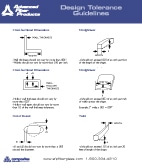 Design Tolerance Properties
Design Tolerance Properties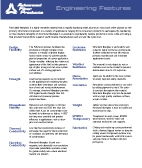 Engineering Features
Engineering Features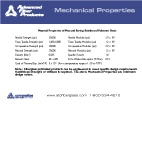 Mechanical Properties
Mechanical Properties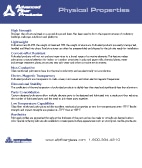 Physical Properties
Physical Properties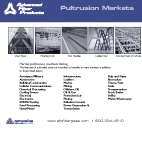 Pultrusion Markets
Pultrusion Markets